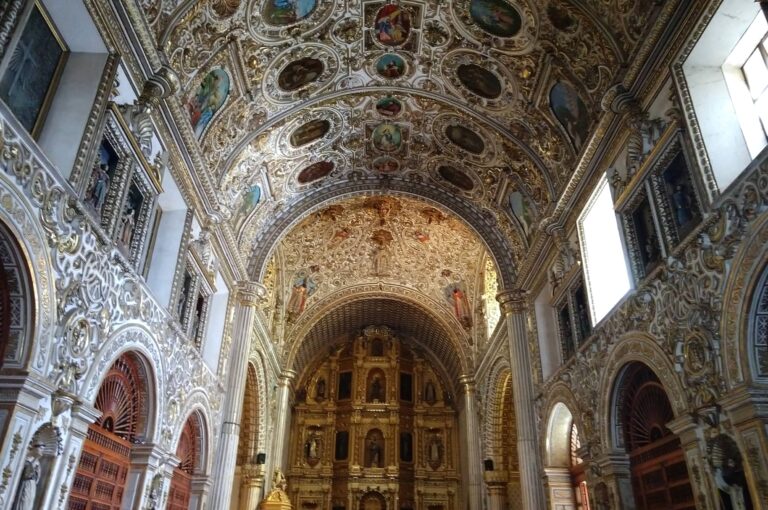

Culture and Traditions
Destinations
Beaches
Adventure and Nature
Magical Towns
Information
MICE tourism
Culture and Traditions
Destinations
Adventure and Nature
Magical Towns
Beaches
Information
MICE tourism

FABULOUS RELIGIOUS COMPLEX
Its original name is Teposcololan, which means "Next to the twist of copper." It comes from the words Tepoztli: copper, colotl: twist, and the variant Tla: next to or among.
This town was an important enclave for the Dominicans. The convent was founded in 1538, and the Dominican order had another permanent establishment in the Mixteca region.
One of the most deeply rooted traditions in the village is the Dance of the Mascaritas, which dates back to the late 19th century. It originated when men went out to dance to the rhythm of "son" music to celebrate their victory over the French army. This tradition has evolved over time, becoming a dance with elaborate costumes and masks. It is celebrated every year on August 6th.
Due to its elevation of 1,169 meters above sea level, its climate is rather cool and semi-dry, with an average yearly temperature of 16ºC. During the summer months, temperatures can reach up to 29ºC, while in winter, they can drop to as low as 5ºC.
It is located 120 km (one hour and 45 minutes) southwest of the city of Oaxaca, 300 km (4 hours) from Puebla, and 421 km (6 hours) from Mexico City.
San Pedro y San Pablo Teposcolula





Your dream journey is closer than you imagine..
.. and more affordable than ever.
What to See in San Pedro and San Pablo Teposcolula
Tourist Attractions in San Pedro y San Pablo Teposcolula
Municipal Park
It is a beautiful space with gardens and adorned with the monument of "Las Mascaritas." In front, you can find the Portal of Dolores and the Parish House.
Palacio Municipal (City Hall)
This building features a wide arcade with semi-circular arches and a clock in the middle. The entire facade shows beautiful decorations.
Templo y Ex Convento de San Pedro y San Pablo
This building has withstood the test of time and is considered one of the most spectacular colonial constructions in the state.
It has a magnificent open chapel, which is one of the most significant works of the 16th century in New Spain and is unique in America due to its enormous proportions.
Inside the temple, you can still see 8 beautiful altars, and some works by the painters Andrés de la Concha and Andrés Pereyns are preserved. However, one of the most outstanding features is a beautiful image of the "Señor de las Vidrieras," accompanied by a legend.
It is said that once two mule drivers arrived in the town carrying two images, one of the Virgin of the Assumption and another of a Christ figure. The latter fell and couldn't be lifted again as it was too heavy. Although they were just passing through, they decided to stay for one night, and during that time, the image was covered with ice. Thus, they decided to leave the image in Teposcolula, and due to the ice, the image took on a glassy appearance, hence the name "Señor de las Vidrieras" (Lord of the Stained Glass).
The monastery now serves as a small museum, with some restored cells surrounding a beautiful garden. The spacious atrium was built to instruct the Mixtec people in large numbers simultaneously.
Cacica's House
Opposite the church, the Spanish built the "Casa de la Cacica" (House of the Female Chieftain) in 1560 for a Mixtec leader. Its construction combines pre-Hispanic and colonial elements and currently houses a library. The beautiful combination of white and pink quarry on the upper friezes stands out.
Yucundaa Archaeological Zone
Two kilometers away lies the archaeological site of Pueblo Viejo (Yucundaa) on a mountain that rises 220 meters. The site was one of the most important Mixtec chieftains between 1000 and 1550 AD.
What to Do in San Pedro and San Pablo Teposcolula
Choose your Adventure in Oaxaca
UNMISSABLE EXPERIENCES IN SAN PEDRO Y SAN PABLO TEPOSCOLULA
Discover Ancient Vestiges
You can explore the Cerro de Pueblo Viejo or Yucundaa, which is only 10 minutes from downtown Teposcolula.
Here, you can find several remnants of a ballgame court and other buildings believed to be houses. These are the remains of one of the most important Mixtec chieftains of the Postclassic period.
This is a site worth exploring, and there are even some areas where you can camp.
Explore a Magical Spring
Don't miss visiting El Alarcón; the locals believe that the water from the nine springs has magical properties, and each of them has a different flavor.


































